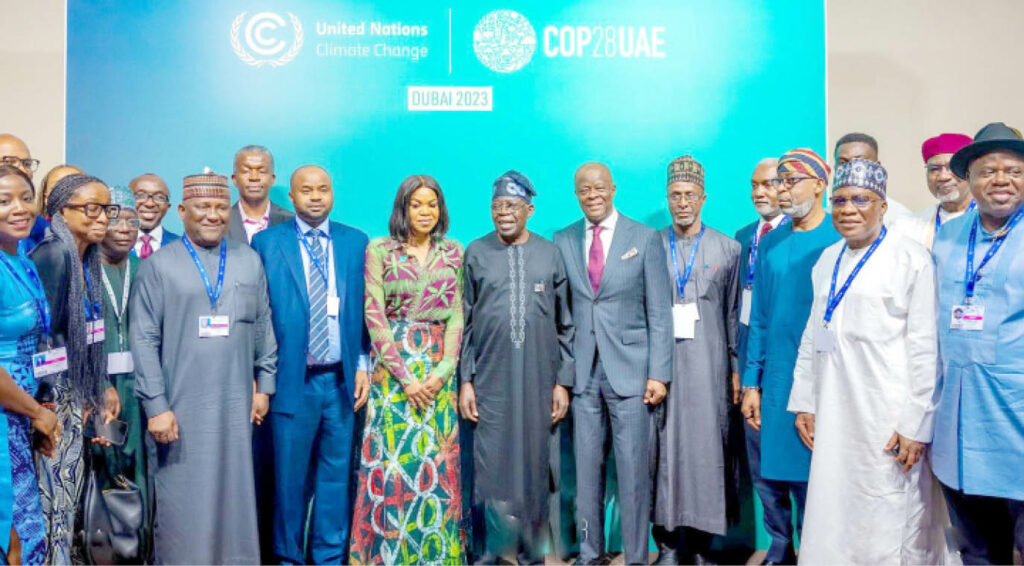- The Nigerian government allocated over N2.78 billion for estacodes and airfares for a 422-member delegation attending COP28 in Dubai
- Per diem for ministers, agency chiefs, and directors ranged from $500 to $900 per night, totaling millions, drawing criticism
The Federal Government of Nigeria allocated over N2.78 billion for estacodes and airfares for ministers, agency heads, directors, and other delegates who attended the United Nations Climate Change Conference (COP28) in Dubai. The conference, held from November 30 to December 12, 2023, witnessed a 1,114-member delegation from Nigeria, with the federal government sponsoring 422 officials.
As per the Revenue Mobilisation, Allocation, and Fiscal Commission (RMAFC), the per diem for ministers, agency chiefs, and permanent secretaries was $900 per night, while directors received $500 per night. The breakdown revealed that 27 ministers, 15 agency chiefs, and 95 directors were part of the government-sponsored delegation.
For the 12-day conference, the per diem for each minister amounted to about N900,000 per night, totaling N10.8 million, equating to N291 million for all 27 ministers. Similarly, the 15 agency chiefs received N900,000 per diem, totaling N162 million. The 95 directors received $500 per night, amounting to N570 million.
Additionally, flight costs were incurred, with return tickets ranging from N1.2 million to N8.6 million depending on the airline and class. At least N1.6 billion was estimated for flight tickets alone, considering a minimum of N4 million per participant for an economy class ticket. Critics, including opposition figures, and civil society groups, have condemned the government for what they perceive as an unnecessary expense amid economic challenges in the country.
Defending the government’s position, the Minister of Information and National Orientation, Mohammed Idris, emphasized Nigeria’s significant stake in global climate change action due to being the most populous country in Africa and having substantial vulnerabilities to climate change. The government-funded delegation comprised representatives from various sectors, with active participation deemed necessary for Nigeria’s role in climate action.
The Federal Government of Nigeria allocated over N2.78 billion for estacodes and airfares for ministers, agency heads, directors, and other delegates who attended the United Nations Climate Change Conference (COP28) in Dubai. The conference, held from November 30 to December 12, 2023, witnessed a 1,114-member delegation from Nigeria, with the federal government sponsoring 422 officials.
As per the Revenue Mobilisation, Allocation, and Fiscal Commission (RMAFC), the per diem for ministers, agency chiefs, and permanent secretaries was $900 per night, while directors received $500 per night. The breakdown revealed that 27 ministers, 15 agency chiefs, and 95 directors were part of the government-sponsored delegation.
For the 12-day conference, the per diem for each minister amounted to about N900,000 per night, totaling N10.8 million, equating to N291 million for all 27 ministers. Similarly, the 15 agency chiefs received N900,000 per diem, totaling N162 million. The 95 directors received $500 per night, amounting to N570 million.
Additionally, flight costs were incurred, with return tickets ranging from N1.2 million to N8.6 million depending on the airline and class. At least N1.6 billion was estimated for flight tickets alone, considering a minimum of N4 million per participant for an economy class ticket. Critics, including opposition figures, and civil society groups, have condemned the government for what they perceive as an unnecessary expense amid economic challenges in the country.
Defending the government’s position, the Minister of Information and National Orientation, Mohammed Idris, emphasized Nigeria’s significant stake in global climate change action due to being the most populous country in Africa and having substantial vulnerabilities to climate change. The government-funded delegation comprised representatives from various sectors, with active participation deemed necessary for Nigeria’s role in climate action.
